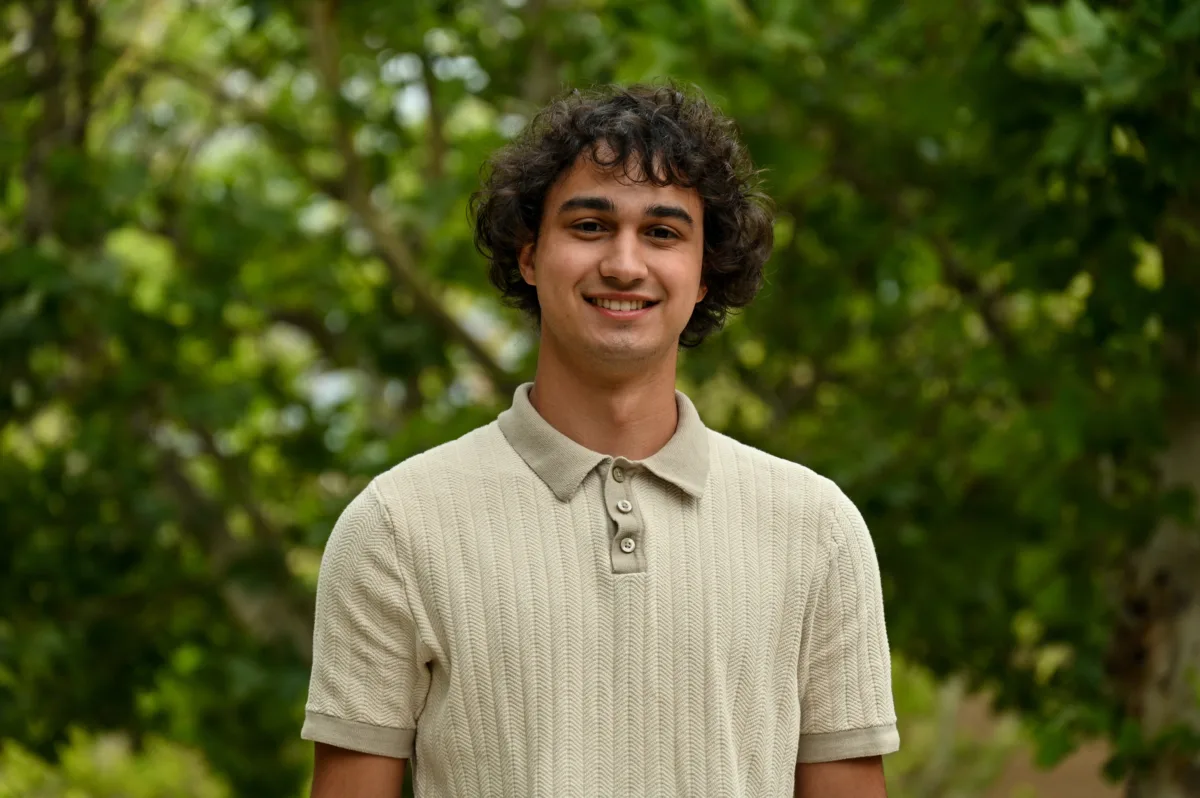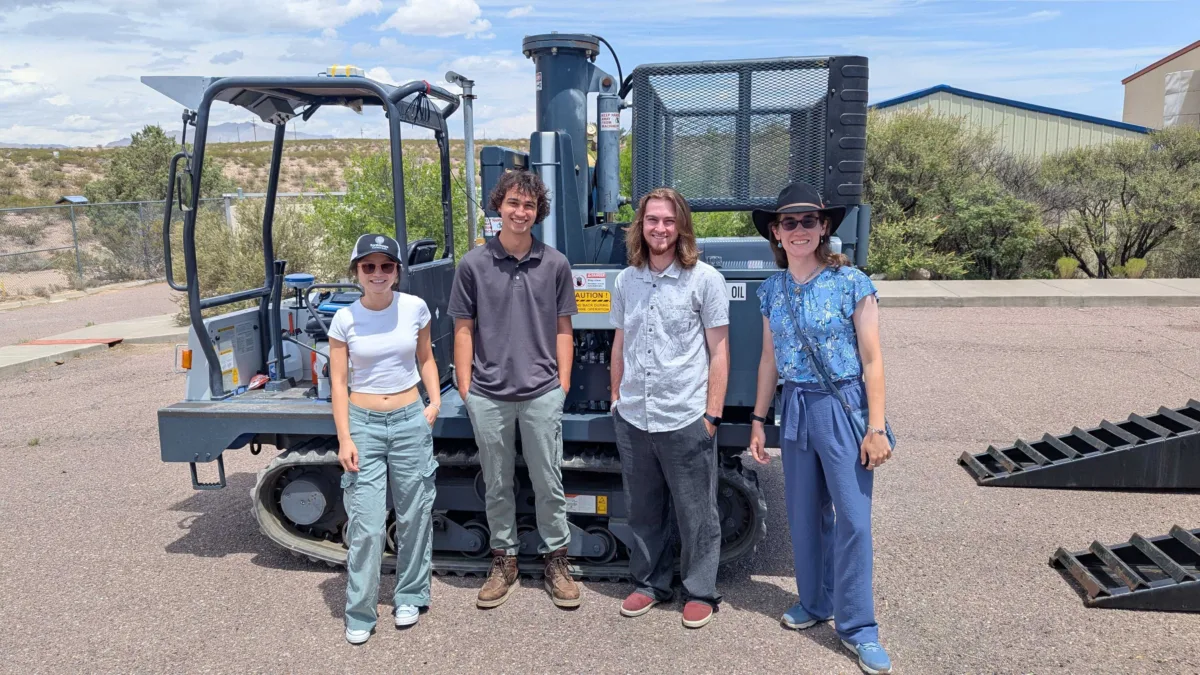

This summer we’re introducing interns from Student Career, RESESS, and Geo-Launchpad programs to highlight their research projects and how EarthScope programs further their career goals.
Dylan Bond is one of EarthScope’s Summer 2025 Geo-Launchpad interns. Working at the New Mexico Bureau of Geology, his project focuses on researching seismic background noise in southeastern New Mexico.
To learn more about Dylan, listen to his interview or read the transcript below!
VM: Hello, everyone. My name is Viridis Miranda. I’m an EarthScope intern, specifically in science communication, and I’m interviewing Dylan Bond, who is also an intern at EarthScope Consortium. Hello Dylan, how are you doing today?
DB: I’m doing great today. How are you?
VM: Doing awesome. And it’s a pleasure interviewing you on this lovely day. So Dylan, can you tell us a little bit about what you do at EarthScope and your internship position?
DB: Yeah. So I am a Geo-Launchpad intern, which means that I’m a community college student. It’s a different subsection of the EarthScope internship program. Currently I am in Socorro, New Mexico, right down the street from the [EarthScope]Primary Instrument Center, although I’m not working there. I’m working at the Bureau of Geology here on campus at New Mexico Tech, and I’m working on seismological research looking at seismic background noise in southeastern New Mexico.
VM: Awesome. And what do you most like about it?
DB: I like that I’m finally getting my hands onto actual research. A lot of my project is coding with Python and other terminals and stuff that I am not used to and have had zero experience with prior. So it’s really cool to learn that stuff in this light of something I’m really interested in. So yeah, it’s just a great experience, overall, great learning experience. It’s not, you know, I’m not looking at earthquakes, but I am looking at what the seismometers actually give off. And, yeah, it’s just super interesting, very, very interesting.
VM: Cool. And do you consider yourself more a field work person, or more into programming?
DB: Before this, I would say I was more into field work, although I didn’t have any experience in that either. But yeah, I definitely do enjoy the programming bit. I feel like I’m able to balance programming and sitting at the computer with my outdoorsy personality. So I’m able to get my programming done and still have time to go on runs or go hiking. And I think it’s a good work life balance.
VM: Amazing. That’s amazing that you find a work life balance within your internship position. And what would you say that is the most useful programming tool that you have gotten to know during the internship?
DB: I’ve been using PyGMT, which is a mapping tool that is very widely used within the discipline. So being able to use that and then look at research papers that have similar figures because they’re using that same program, it’s pretty exciting, and I was able to get the hang of it very quickly. It just made a whole lot of sense to me. So yeah, it’s very exciting to be using something that is actually used in the science as well, and to be proficient at it.
VM: That’s pretty cool. I’m a geophysical analyst at the Puerto Rico Seismic Network, and I’m also a grad student. And I’ve been learning Google Colab, which is a cloud notebook, and currently learning how to program in Python, but using a Google Colab notebook. And my question towards this, and that’s why I’m giving a little bit of backstory, have you used any of this programming tools before the internship?
DB: Absolutely none of it. No, I have a twin brother who is computer whiz. He’s been coding since we were 10 or 11, and it was never really my thing. So I have almost zero experience with coding. I didn’t even know what Python was. During orientation week, we had a small little seminar about Python coding, and I was just so lost. But yeah, coming into this, I had zero experience with coding, and that was probably my biggest insecurity going into this discipline, because I knew I needed to at least have some idea how to code if I wanted to go anywhere. So yeah, it’s zero experience going into this.
VM: That’s cool, and no need to worry. When I went well into my graduate research, I didn’t have any formal training in programming, either, but that’s pretty cool that your twin brother was a computer whiz at 10. That’s pretty amazing.
DB: Yeah, he’s a smart one.
VM: You’re pretty smart too, so give yourself a little bit more credit than that.
DB: I’ll try, I’ll try.
VM: Oh for sure, for sure, you got to give a little bit more credit for that. And another question is, what advice would you give to aspiring students going into this internship?
DB: If they have been accepted, or they’re looking to go into it?
VM: Oh no, no worries, if they’re looking to apply for it. Like, what advice would you give them?
DB: I would advise them that all you have to do is be yourself. Going into this, I had only taken two or three geology related classes, and all I had was that passion. All I had was that drive that I knew this is what I wanted to do, and I wasn’t going to let anyone tell me that this wasn’t for me. So, just keep your head up. Don’t be intimidated. They want people who are driven and who are themselves. It doesn’t matter about experience level. It just matters that you’re willing to put in the work and to prove yourself to yourself and to everyone around you.
VM: Oh, that’s amazing. That’s pretty good. Also, another word of advice that I also would like to add to that is, never let your inner fear speak for you. We are never full on learners or experts at what we do. We learn as we go along this trajectory, and we’re always students, always all the time. So even though I’m a grad student, I’m still learning a lot, and also I’ve learned so much from undergraduates as well. And do not let imposter syndrome get the best of you. You know more than anything.
DB: Yeah, going into this during our orientation week in Albuquerque at UNM [University of New Mexico], I quickly learned that I was the youngest one in the cohort of about 30 interns. And along with that, I realized that I was pretty inexperienced, alongside a lot of them. I had kind of different interests than a lot of people there, but I didn’t let that change anything. I knew my worth. I knew that this was where I belonged. I knew that I was chosen to be here, and this is where I belonged, and it was just a matter of finding my way through it, you know, paving my own way. And, yeah, once again, not listening to your inner your inner fears.
VM: Exactly, for sure you do belong there, and you’re pretty cool. So all about all the other things that you do for EarthScope, and they’re pretty neat and pretty awesome. What other extracurricular activities or other hobbies that you do?
DB: Wow. Okay, so I am a big reader. I’ve always been a big reader, off and on since I was little. We have a giant library at my house of thousands of books, which is awesome. So big reader. I collect music as well. I have a big CD collection at home, about 400 CDs at home, and I bought a lot of them with me as well. Outside of that, like I said, I love to be outdoors. I love to go hiking. There’s not many opportunities to do that back at home, so I definitely make the most of it here. Big sports nerd. I love hockey. I love baseball, you know, just a little bit of everything, to be honest with you,
VM: A jack of all trades. That’s super awesome and that’s super awesome that you like to read. So what would you say would be your favorite book?
DB: My favorite book? I just finished up a book by George Eliot called Adam Bede, which was her first book, her first novel. And it was very, very interesting. I learned a lot about different branches of Christianity that I wasn’t familiar with, and also just about Victorian Age Britain, which is something that I’m interested in. I’m also very interested in modern African literature V.S. Naipaul is one of my favorite authors. I like some SciFi. I’m a big Kurt Vonnegut fan. The list goes on and on. I just, I just devour anything in front of me. I’m a voracious reader.
VM: That’s super amazing. There are a couple of, um, well, I don’t know if you’re more of Star Trek or Star Wars fan, but a whole bunch of books talking about the lore of both Star Trek and Star Wars. Star Trek has a lot of books of. What is true and what is not. So those are pretty good read.
DB: That’s pretty interesting. I’ll have to look into that. I’m more of a Star Trek person. I will say.
VM: Oh, most, most definitely. Both of my parents are Trekkies, and they’re both into Star Wars as well. So I’m kind of like a hybrid. But I do enjoy reading as well in my free time, and I also encourage lots of students to do that as well, because once you go up levels, you need to read a lot of research papers, and sometimes reading can get a little bit taxing, and if you get those reading skills done, it would make you a very like competitive professional in the future.
DB: Definitely, definitely. And just reading anything really, I mean, keeping your reading level and attention span at a sizable at a comfortable limit. You know, I don’t read every day, but I try to and I’ll read almost anything, non-fiction, fiction, research stuff, textbooks, just anything and everything, whatever interests you, just read it, and you know, you’ll be able to work with anything at that point. It’s just a really good skill that’s a lifelong skill that you need to keep building.
VM: That’s pretty cool. Well, thank you so much Dylan, for that wholesome insight. And I wish you the very best in Geo-Launchpad and everything that you put your mind to. I wish you the very best.
DB: Thank you so much. It was great speaking with you.

